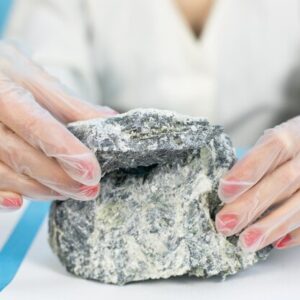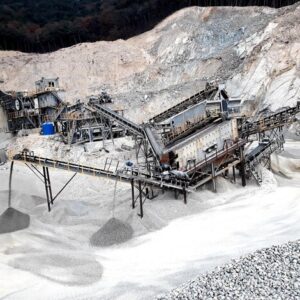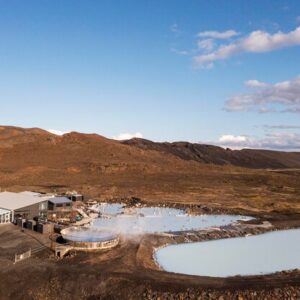Bentonite clay, derived from volcanic ash, is a powerful natural substance with a wide array of industrial, environmental, and personal care applications. Two primary types of bentonite—sodium bentonite and calcium bentonite—have distinct properties, each making it suitable for different uses. Understanding these differences can help in selecting the right bentonite for specific applications, from drilling muds and pond sealing to skincare and detoxification.
What is Bentonite?
Bentonite is a type of clay composed predominantly of montmorillonite, a mineral known for its ability to swell and absorb water. Discovered in Fort Benton, Wyoming, bentonite has a unique ability to expand when wet, which makes it invaluable in several industries. The two most common forms are sodium and calcium bentonite, each with unique characteristics influenced by the minerals that saturate the clay.
Sodium Bentonite: Composition, Properties, and Applications
Sodium bentonite contains sodium ions, which are responsible for its remarkable swelling capability. When sodium bentonite comes into contact with water, it can expand up to 15 times its original volume, forming a dense, gel-like barrier. This high swelling capacity makes it highly effective as a sealing agent and is favored for industrial and construction applications.
Properties of Sodium Bentonite:
- High Swelling Ability: Sodium bentonite can swell significantly when hydrated, which allows it to create a water-tight barrier.
- High Absorption: It can absorb large amounts of water, which makes it effective in applications where water containment is critical.
- Binding and Thickening Agent: Its ability to bind with other materials makes it useful as a thickener.
- Low Permeability: When hydrated, it forms a dense layer that can prevent water leakage.
Uses of Sodium Bentonite:
- Environmental Applications: Used in the lining of landfills, waste disposal ponds, and lagoons, sodium bentonite prevents leakage and contamination.
- Drilling Fluids: In the oil and gas industry, it is used in drilling muds, which help stabilize boreholes and carry drill cuttings to the surface.
- Pond Lining and Sealing: Its swelling properties make sodium bentonite ideal for sealing ponds and small dams.
- Foundry Sands: In the foundry industry, sodium bentonite is used as a binder in sand molds for metal casting.
- Construction: It is employed as a waterproofing agent in foundations, tunnels, and other structures.
Calcium Bentonite: Composition, Properties, and Applications
Calcium bentonite contains calcium ions, giving it a distinct set of properties compared to sodium bentonite. Unlike sodium bentonite, calcium bentonite does not swell as dramatically; instead, it has a lower expansion potential and is generally more suitable for absorption applications rather than creating barriers.
Properties of Calcium Bentonite:
- Moderate Swelling Ability: Calcium bentonite has a lower swelling capacity than sodium bentonite.
- Strong Absorptive Qualities: It is highly effective at absorbing toxins and impurities, which makes it valuable for detoxification purposes.
- Non-Clumping Nature: It does not form a dense, impermeable barrier, but it still has valuable absorption properties.
- Better Cation Exchange Capacity (CEC): This property allows calcium bentonite to attract and bind with positively charged particles like toxins and heavy metals.
Uses of Calcium Bentonite:
- Health and Personal Care: Calcium bentonite is often used in skincare masks, toothpaste, and detox products due to its ability to absorb toxins from the skin and body.
- Animal Feed Additive: It is used to absorb toxins in animal feed and improve digestion.
- Soil Conditioner: Calcium bentonite is sometimes added to soil to help with water retention and provide essential minerals.
- Agriculture: It is used in soil amendments to improve nutrient retention and soil structure.
Key Differences Between Sodium Bentonite and Calcium Bentonite
- Swelling Capacity: Sodium bentonite has a high swelling capacity, allowing it to expand significantly upon hydration, making it ideal for sealing applications. Calcium bentonite has a lower swelling potential and does not form a dense barrier when hydrated.
- Absorptive vs. Adsorptive Properties: Sodium bentonite is highly absorptive, meaning it can take in a large amount of water. In contrast, calcium bentonite is adsorptive, meaning it has a high surface area to attract and bind toxins and impurities, making it useful for detoxification.
- Permeability: Sodium bentonite is much less permeable than calcium bentonite, creating an effective water-tight seal. Calcium bentonite, with its lower swelling and higher permeability, is not used as a sealant but is better suited for applications where absorbing impurities is the primary goal.
- Industrial vs. Personal Use: Sodium bentonite is largely used in industrial applications, such as in drilling fluids, pond sealing, and waste containment. Calcium bentonite, on the other hand, is preferred for personal care products, detox supplements, and soil amendments.
Choosing the Right Bentonite for Your Needs
The choice between sodium and calcium bentonite depends on the specific application requirements. Here are a few considerations:
- If Water Sealing is Needed: For pond lining, landfill covers, or sealing foundations, sodium bentonite is the preferred choice due to its high swelling and low permeability.
- For Detoxification and Skincare: Calcium bentonite, with its superior adsorptive capacity, is ideal for absorbing toxins from the skin or the digestive system.
- In Soil Conditioning: Calcium bentonite, with its mineral content, is often preferred as a soil additive to improve water retention and nutrient absorption.
- In Drilling and Construction: Sodium bentonite is commonly used in the oil and gas industry for drilling fluids and construction waterproofing due to its swelling and sealing abilities.
Health Benefits of Calcium Bentonite in Skincare and Detoxification
Calcium bentonite clay has gained popularity for its health and skincare benefits. As a natural detoxifier, it binds to toxins, heavy metals, and impurities, helping to draw them out from the skin or digestive tract.
Skincare Uses:
- Face Masks: Applied as a facial mask, calcium bentonite can reduce acne, remove excess oils, and minimize pores.
- Anti-Inflammatory: It has soothing properties that may help reduce skin inflammation and redness.
- Wound Healing: Calcium bentonite is used as a wound dressing due to its ability to absorb moisture and support the healing process.
Internal Detoxification:
- Digestive Health: Taken internally (food-grade only), calcium bentonite is used as a detox supplement that can absorb toxins in the digestive tract.
- Heavy Metal Detox: It may help in removing heavy metals from the body due to its high cation exchange capacity.
Environmental and Industrial Advantages of Sodium Bentonite
Sodium bentonite is particularly valuable in environmental and industrial settings where its swelling properties allow it to create effective barriers. The clay forms a gel when wet, providing essential benefits in waste containment and drilling operations.
Waste Containment:
- Landfill Liners: Sodium bentonite is widely used to line landfills, where its impermeable properties prevent the leakage of contaminants into the surrounding environment.
- Pond and Lagoon Sealing: When used as a liner for ponds and lagoons, it provides a cost-effective and environmentally friendly way to prevent water seepage.
Construction Applications:
- Waterproofing: It can be used to waterproof basements, tunnels, and other structures, protecting against water damage.
- Drilling Fluids: In drilling mud, sodium bentonite stabilizes the borehole, lubricates the drill bit, and carries drill cuttings to the surface, aiding in efficient drilling operations.
Conclusion
Both sodium and calcium bentonite offer unique advantages, serving distinct roles across industrial, environmental, and personal care sectors. Sodium bentonite is highly effective for applications requiring swelling and water sealing, while calcium bentonite shines in applications that benefit from its adsorptive and detoxifying properties. Understanding the properties of each type of bentonite allows for an informed choice that optimizes performance for specific needs—whether that’s protecting the environment, supporting industrial projects, or enhancing personal health and wellness.






